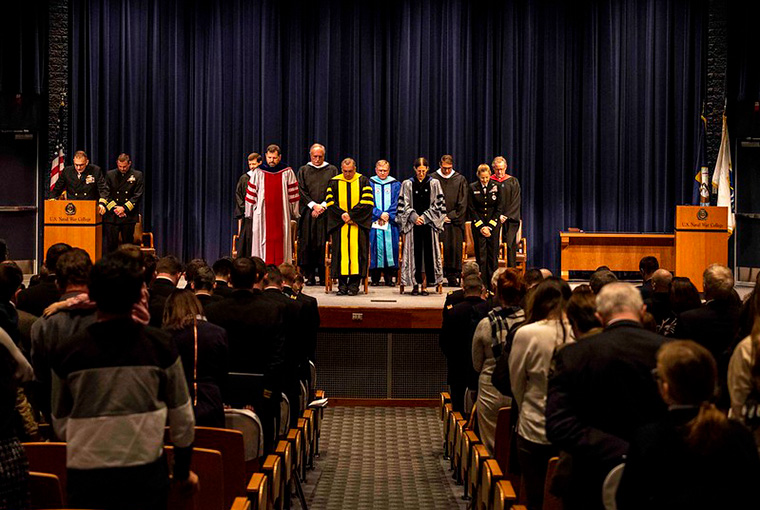U.S. Naval War College Awards 57 Degrees in March Graduation

NEWPORT, R.I. -- Fifty-seven U.S. military officers graduated with Master of Arts degrees from the U.S. Naval War College on March 3, concluding a year’s study of national security issues and defense strategy.
The graduates included 44 officers from the Navy, six from the Army, one each from the Air Force and Marine Corps, three from the Army National Guard and two from the Army Reserve.
The honor graduate from the College of Naval Warfare, which represents senior officers, was Lt. Col. Michael Seek of the Army National Guard.
Seek said his success comes from the people who helped him along the way. “To the faculty and staff, thank you for the instruction, guidance and mentorship you provided over the last year,” Seek said from the podium. “You not only challenged me on what I thought, but how I thought.”
The honor graduate from the College of Naval Command and Staff, which includes intermediate-level officers, was Army Maj. Brian Molloy. He was also the sole March graduate who earned the college’s Ethics and Emerging Military Technology Program graduate certificate.
Two other March graduates, Navy Capt. Michael Rak and Cmdr. Maxwell Oliver, were the inaugural recipients of certificates in the college’s new Graduate Certificate in Maritime History Program.
Read more about the college's new Graduate Certificate: Archival Adventures: Graduate Certificate in Maritime History Awarded to First Students in New Program.
“Technology is agnostic. There’s nothing inherently disruptive about it. It’s the people who implement those technologies through doctrine, through publications and through the changes that we make to our services that make this ability disruptive,” Molloy said from the stage.
“That’s the biggest takeaway I have from my educational experience here. And that’s something that I hope all of you take back with you as you go back to the force,” he said.
The classes chose Sally Paine, the William S. Sims University Professor of History and Grand Strategy, to deliver the graduation address.
Paine, a China scholar, spoke about the value of acknowledging when you are wrong.
“Many think admitting a mistake is really hard, and they go to great lengths not to. Actually, the hard thing is throwing away your reputation in the cover-up, or in failing to acknowledge what everyone else finds to be absolutely obvious,” Paine told the graduation audience in Spruance Auditorium.
“In the Strategy and Policy Department, we require students to include a counterargument in their papers. Why? In order to understand the world from the point of view of their most persuasive critics,” Paine said.
“We live in a world of incomplete information and different priorities. As a result, we come to different conclusions. As more information becomes available, the counterargument may turn out to be right,” Paine told the graduates. “Don’t be afraid to change your mind and reassess.”
Linking her premise about truth versus cover-up to the coronavirus COVID-19 in China, Paine predicted that the Chinese government’s efforts to stifle information in the early days of the disease’s spread will lead to catastrophic repercussions for that nation.
“With the closing of borders (due to the virus,) China’s Belt and Road initiative is over,” Paine said. “China’s economy will go off a cliff if air and sea travel do not resume rapidly.”
Naval War College President Rear Adm. Shoshana S. Chatfield told graduates that the new Education for Seapower Strategy 2020 sees education as a key strategic enabler for the force in the future.
“In order to deter and if necessary outfight our adversaries, we must learn and commit ourselves to outthinking them,” Chatfield said.
“This past year here at the college is where you have invested in your preparation to do just that,” she said. “Our leadership views this investment in your education as a direct investment in our warfighting advantage.”
Chatfield then sent the new graduates off on their career paths with the charge to link what they’ve learned to how the United States fights.
“You are duty bound to take your strengthened intellect, your improved analytical skills and your expanded perspective to lead well and advise well,” she said.
Established in 1884, the U.S. Naval War College is the oldest institution of its kind in the world. Today, the college offers a one-year graduate-level program to roughly 600 resident students annually. While many of these students graduate in June, others receive their degrees in March and November.
Another 1,000 distance-learning students complete the college’s core joint professional military education courses each year, with some going on to earn the master’s degree.
